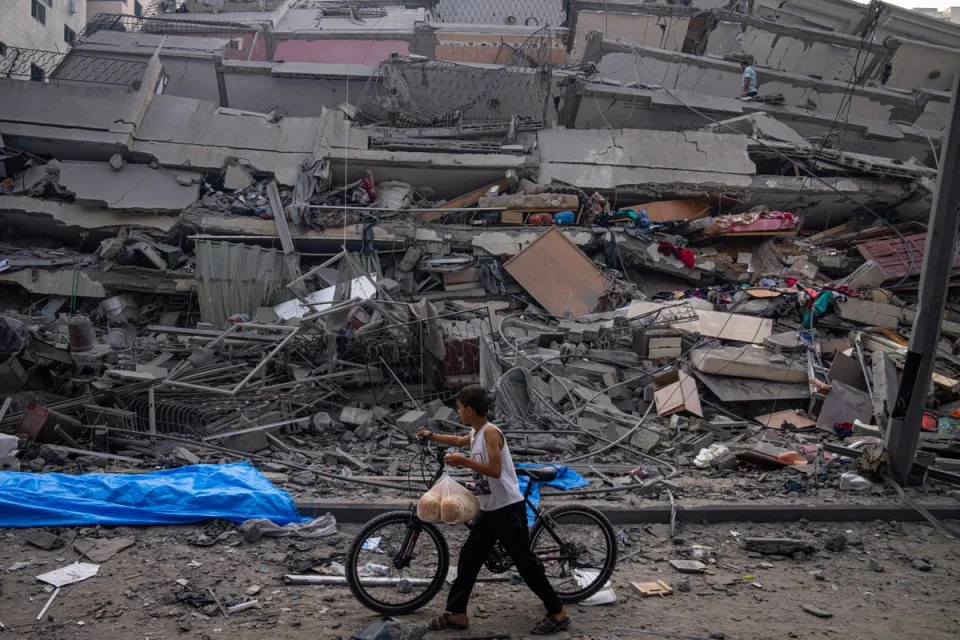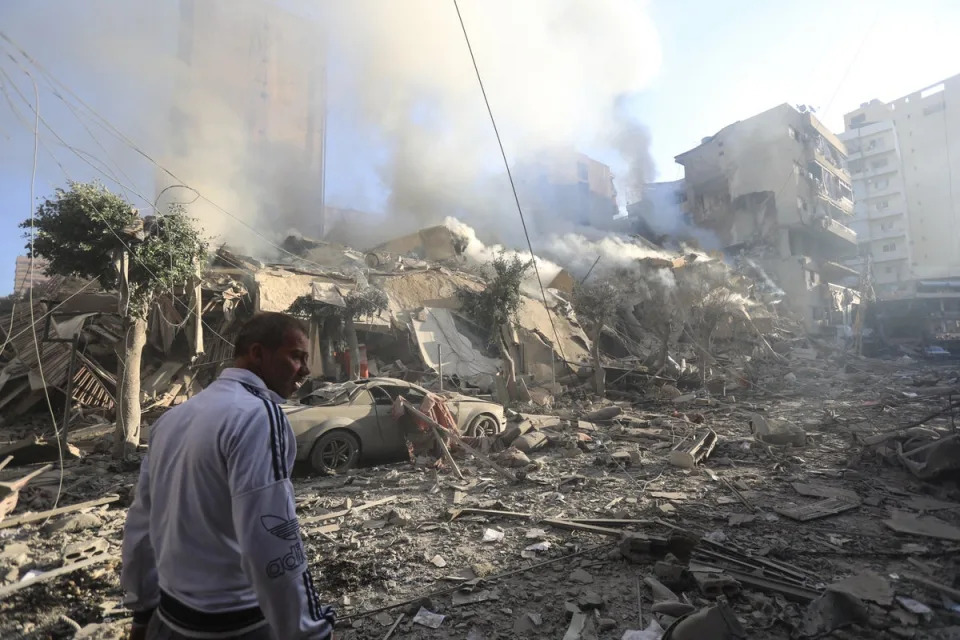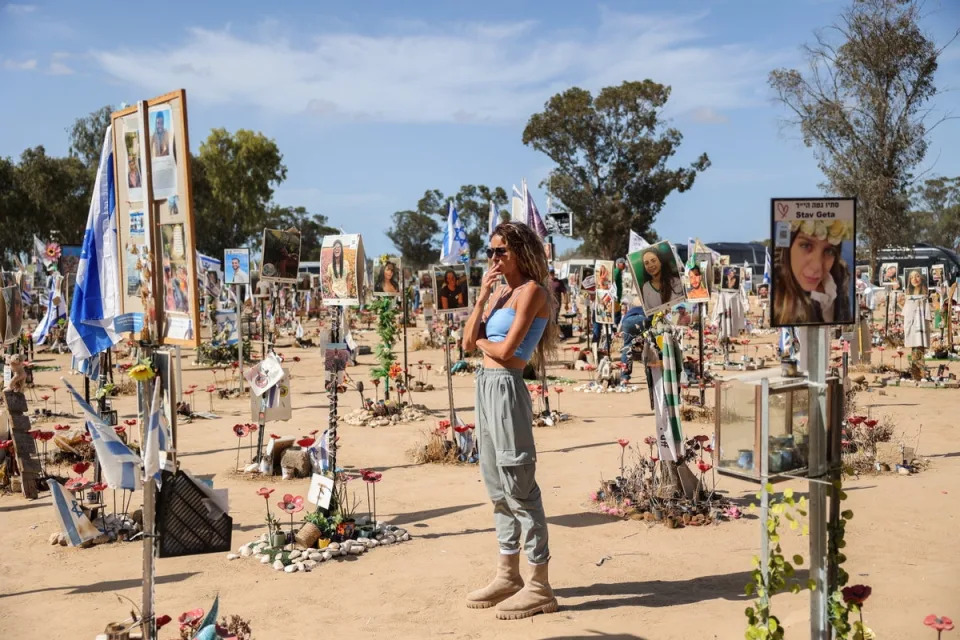Richard Hall
Mon, October 7, 2024
In the weeks following the brutal Hamas attacks in Israel on October 7 last year, Joe Biden made clear his two priorities. He said he wanted to ensure Israel had the means to go on the offensive against Hamas in Gaza, and to prevent a wider regional war that could drag in US forces.
He achieved the first by ensuring a steady flow of weapons and aid to Israel to the tune of $17.9 billion, without any conditions on their use. On the second, he failed dramatically.
In recent days, Israel has invaded Lebanon to its north and killed hundreds of civilians in a bombing campaign. The Houthis in Yemen are firing sporadic salvos towards Israel. Iranian ballistic missiles rained down on Israel in the first week of October, and a fierce Israeli response is expected that could enflame the region further. Tens of thousands of civilians have been killed by Israel in Gaza, many of them with US weapons, and the war still rages.
Biden’s failure has been so great that some former State Department officials have wondered if it was not a failure at all, but part of a shifting strategy to reshape the Middle East.
“I think it becomes increasingly difficult to say that all of this is simply a tragedy of errors,” former State Department official Josh Paul, who resigned over US support for the war in October last year, told The Independent.
“There is, in Washington right now, a sense that maybe this is an opportunity, a time to settle scores and to sort of press reset on Iranian ambitions in the region, on Hamas and Hezbollah, without regard to the cost in innocent human lives.”
At the center of this question is a simple truth: Biden has repeatedly expressed his belief that a ceasefire is the only way to prevent a regional conflict, but as Israel pursued its maximalist war aims in Gaza and now in Lebanon, he has refused to take the necessary action required to bring one about.
That argument was given added impetus with the muted reaction from the White House to Israel’s widespread bombing and subsequent invasion of Lebanon last week, in response to Hezbollah rocket fire directed at northern Israel — precisely the outcome Biden claimed to want to prevent.
Biden called the Israeli killing of Hezbollah leader Hassan Nasrallah, with several US-made 2,000lb booms, a “measure of justice,” while restating US aims to “de-escalate the ongoing conflicts in both Gaza and Lebanon through diplomatic means.”
Behind the scenes, meanwhile, US officials were speaking of Israel’s Lebanon invasion as a “history-defining moment,” according to reporting in Politico, “one that will reshape the Middle East for the better for years to come.”
The same officials said that Brett McGurk, the top Middle East White House advisor, “told top Israeli officials in recent weeks that the U.S. agreed with Israeli Prime Minister Benjamin Netanyahu’s broad strategy to shift Israel’s military focus to the north against Hezbollah.”
Those competing messages have defined the administration’s response over the last year as the war spread to new borders.

A Palestinian child walks with a bicycle by the rubble of a building after it was hit by an Israeli airstrike, in Gaza City, Oct. 8, 2023 (Copyright 2023 The Associated Press. All rights reserved)
There was no question in the immediate aftermath of October 7 — when Hamas killed 1,200 people in Israel and took hundreds of hostages — that the US would give its full support to Israel.
However, it soon became clear that Israel did not have a coherent plan for what to do with Gaza beyond destroying Hamas.
By December, the situation in Gaza was “far beyond” a humanitarian crisis, in the words of medical charity Medicins Sans Frontieres. The death toll had passed beyond 20,000 and some 85 per cent of Gaza’s 2.3 million population had been displaced.
As the casualties rose, Biden played a dual role of calling for a ceasefire while sending more and more weapons to Israel for it to carry out the war.
His calls for a ceasefire were repeatedly rebuffed, sometimes humored, but never realized. Israeli prime minister Benjamin Netanyahu, the head of a coalition government propped up by an extreme right-wing party, appeared to have calculated that his political survival depended on continuing the war.
Biden was embarrassed by Netanyahu again and again.
In February, the president told the world that he believed a ceasefire agreement was just days away. It never came.
In July, Israeli media reported that Netanyahu spiked a hostage and ceasefire deal by making new demands in the 11th hour.
There’s never any accountability, and they just continue to flood Israel with more and more weapons. And Israel could not continue this without that influx of weapons
Annelle Sheline, former foreign affairs officer at the US State Department
Just last month, the US believed it had reached an understanding with Israel over a ceasefire in Lebanon — again, Netanyahu walked back his comments.
“I don’t know why Netanyahu said what he said and I don’t know what his considerations were — whether they were political or operational. Ask him why he said that,” White House spokesman John Kirby said.
Opposition to US support for the war grew internally. The State Department saw an unprecedented number of internal dissent memos — a formal process by which staff can express concerns internally about a policy.
At least twelve US government officials have resigned in protest over the war, from across several departments.
Throughout, Biden’s team would brief the media about his private rage, or his being blindsided by Netanyahu’s actions. And yet he still refused, repeatedly, to use the tools he had at his disposal to pressure Israel to end the conflict, even as it became clear that Israel was expanding its ambitions beyond Gaza.
The Biden administration would claim shock after each episode, but Paul believed the repeated cycle was a sign that it wasn’t serious about stopping the growing war.
“These are not idiots. These are people who have been around the block,” said Paul, the former State Department official, of Biden’s national security advisors. “You might pull the wool over their eyes when it comes to ceasefire talks once or twice or three times, but when you’ve done it a dozen times, I think it suggests that there is more going on here.”
Annelle Sheline, who worked in the State Department for one year as a foreign affairs officer before resigning in February, now too believes that some in his administration are seeing opportunity in this regional war, rather than trying to end it.
“Having been on the inside and reading the communiques, they’re saying the same things that they say publicly about supporting a ceasefire, but then the actions say the opposite,” she told The Independent.
“There’s never any accountability, and they just continue to flood Israel with more and more weapons. And Israel could not continue this without that influx of weapons,” she added.
Dr Sheline and other former State Department officials have singled out Brett McGurk, the White House coordinator for the Middle East and North Africa, as a key driving force behind the administration’s abandonment of a comprehensive ceasefire.
“It’s arguable at this point to what extent Biden is really with it, but I think people like Brett McGurk, Jake Sullivan, and Antony Blinken, they see this as a way to contain Iran,” Sheline said.
“Especially Brett McGurk, who has been anti-Iran through several administrations,” she added.

A man walks amid the rubble of a building levelled in an overnight Israeli airstrike that targeted the neighbourhood of Moawwad in Beirut's southern suburbs on October 3, 2024. (AFP via Getty Images)
The last war between Israel and Hezbollah was equally destructive. In 2006, a Hezbollah ambush on a group of Israeli soldiers on the border led to a devastating 34-day conflict that led to the deaths of 1,200 people in Lebanon, mostly civilians, and 157 Israelis, mostly soldiers.
Israel attacked Lebanon’s infrastructure and displaced more than 1 million people.
Then-Secretary of State in the Bush administration, Condoleezza Rice, described Israel’s bombing campaign as “the birth pangs of a new Middle East.”
She was right, but not in the way she thought. Hezbollah emerged from that conflict stronger than before — it was emboldened and claimed victory for surviving, and for continuing to fire rockets throughout.
In the years following it has grown stronger still. It gained valuable fighting experience on the battlefields of Syria’s civil war, its stockpile of Iranian-made and self-produced rockets has never been higher and its capability has improved.
Today, the Biden administration appears to be making a similar calculation — that military force can reshape the Middle East and create a more favorable outcome for both US and Israeli interests.
Brian Finucane, who worked for a decade in the Office of the Legal Adviser at the State Department advising on issues related to the laws of war, arms transfers and war crimes, told The Independent that without a shift in policy from the White House, the regional crisis will only get worse.
“Unless there is a dramatic course correction we’re going to see more suffering and death and more hostilities involving US forces with the Houthis and potentially in Iraq and Syria,” he said.

A woman looks at pictures and memorials for Israeli festival goers who killed by Hamas at the site of the Supernova Music Festival rave near Kibbutz Reim, Southern Israel, 19 September 2024. (EPA)
The actions that the Biden administration should take today, he argued, are no different from those first months of the Gaza war.
“It would be picking up the phone and telling Netanyahu he’s got to do the hostage deal with Hamas, bring about a ceasefire in Gaza, withdraw troops from Lebanon, or the US government is pulling the plug on further arms transfers,” he said.
The implications of not changing course could be hugely consequential, at home and abroad. The involvement of the US in a Middle East war going into an extremely close election will no doubt help Donald Trump against Vice President Kamala Harris.
The refusal of the Biden administration to follow the law on arms transfers to countries suspected of committing human rights abuses also sets a dangerous precedent that Trump can utilize, as will Biden’s campaign against the Houthis in Yemen without seeking Congressional approval.
“It has further weakened the already fairly weak US domestic law and guardrails on the use of force, which will make it easier for President Trump, or whoever succeeds Biden, to once again go to war without congressional authorization,” Finucane said.
Dr Sheline also believes that the US has squandered its international standing and long-term objectives with regard to containing Russia and China for a less important strategic gamble in the Middle East.
“I think they’re actually undermining those policies. The US has squandered international credibility and support, like the coalition that Biden built to counter Russia in Ukraine. He seems to be willing to sacrifice them in order to continue to give these illegal weapons to Israel,” she said.
Paul believes that Biden’s personal history with Israel has clouded his view. His commitment to Israel seemed to be shaped by an idea of a country that no longer existed — one where the US supported an ostensibly liberal state in wars against its autocratic Arab neighbors, not a far-right government against a largely defenseless population.
“I think Biden is unique about this; he is an ideologue when it comes to Israel in a way that I don’t think any of his predecessors have been,” he said.
The State Department’s reputation, he added, after a year of defending Israel’s gross human rights abuses in Gaza, has been irreparably damaged.
“I worked with the State Department spokespeople, and to see them not only debasing themselves, but beclowning themselves, when the facts are so evident, is deeply disappointing.
“It has been very sad for me to see this collapse of American credibility,” he added.









 Palestinians inspect the site of Israeli strikes on houses, amid the Israel-Hamas conflict, in Khan Younis in the southern Gaza Strip, October 2, 2024. —Reuters
Palestinians inspect the site of Israeli strikes on houses, amid the Israel-Hamas conflict, in Khan Younis in the southern Gaza Strip, October 2, 2024. —Reuters






